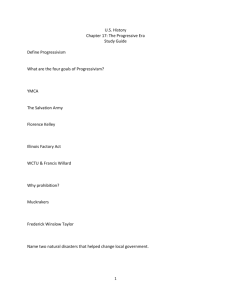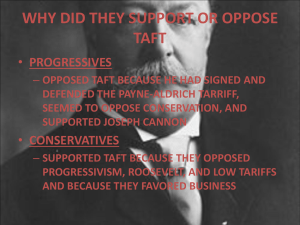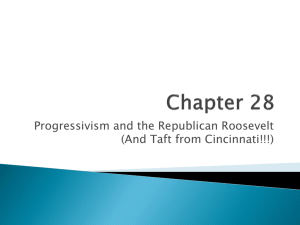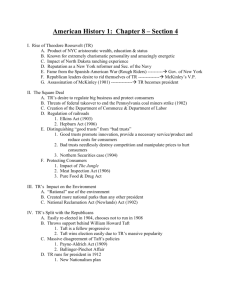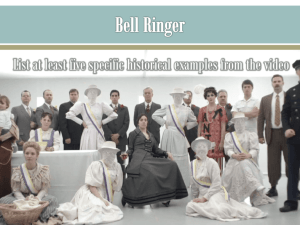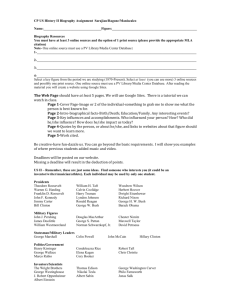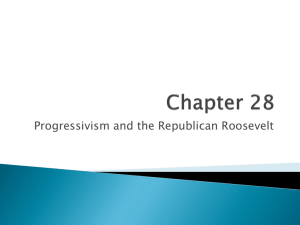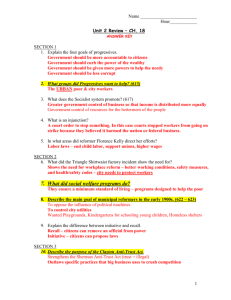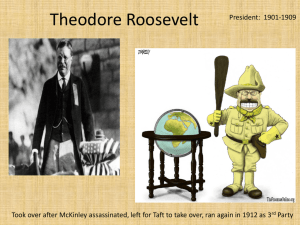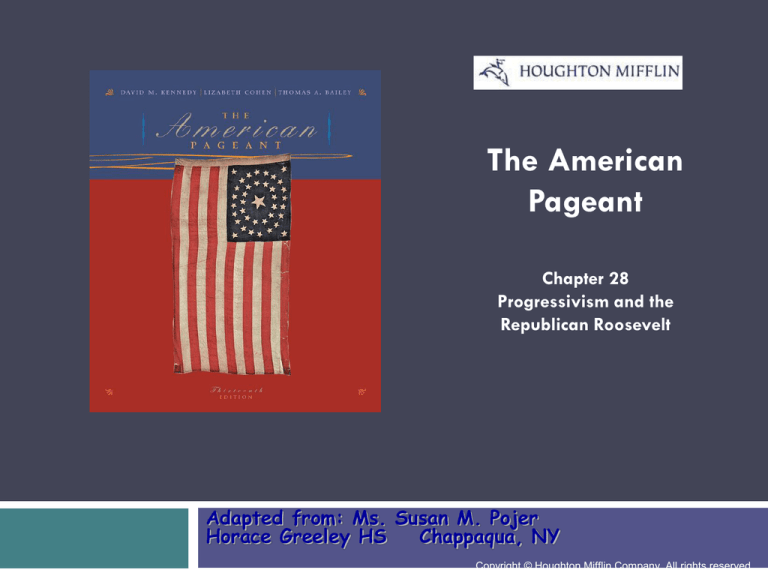
The American
Pageant
Chapter 28
Progressivism and the
Republican Roosevelt
Adapted from: Ms. Susan M. Pojer
Horace Greeley HS
Chappaqua, NY
Copyright © Houghton Mifflin Company. All rights reserved.
Progressive Roots
In the beginning of the 1900s, America had 76
million people
U.S.
would be influenced by a “Progressive
movement”
fought
against monopolies, corruption,
inefficiency, and social injustice
purpose of the Progressives was to use the government
as an agency of human welfare.
M
u
c
k
r
a
c
k
e
r
s
S
u
f
f
r
a
g
e
t
t
e
s
P
o
p
u
l
i
s
t
s
T
e
m
p
e
r
a
n
c
e
G
o
o
G
o
o
s
M
i
d
c
l
a
s
s
W
o
m
e
n
L
a
b
o
r
U
n
i
o
n
s
C
i
v
i
l
R
i
g
h
t
s
Progressive Roots
1894, Henry Demarest Lloyd:
exposed the corruption of the monopoly of the Standard Oil
Company with his book Wealth Against Commonwealth,
Thorstein Veblen
criticized the new rich (those who made money from the trusts) in
The Theory of the Leisure Class (1899)
“Muckrakers”
exposers of the corruption of trusts
Theodore Roosevelt called them this
Authors included:
Jacob A. Riis, wrote--How the Other Half Lives
book about the New York slums & its inhabitants
Theodore Dreiser, wrote The Financier and The Titan to attack
profiteers.
Raking Muck with the Muckrakers
Ida Tarbell
Some view
Michael
Moore as a
modern
muckraker
Muckraker =
Journalists
who
exposed the
underside of
American life
Called people to
action by making
the public aware of
social ills
Political Progressivism
Progressives =
mostly middle-class citizens
felt squeezed by both the big trusts above and the
restless immigrants working for cheap labor that came
from below
Progressive Political Reform:
The ballot initiative: People have the right to
propose a new law
allows citizens to seek direct redress for issues important to them
Recall
allows citizens to remove officeholders in
whom they lost confidence
“referendum”
people
could vote on laws that affected them
Political Progressivism
desired to expose graft
using a secret ballot (Australian ballot) to
counteract the effects of party bosses
Have direct election of U.S. senators to curb
corruption.
in
1913, the 17th Amendment provided for direct
election of senators.
Females also campaigned for woman’s
suffrage, but that did not come…yet.
Progressive Women
Women led the progressive army.
couldn’t
vote or hold political office
were active none-the-less
focused their changes on family-oriented ills
such as child labor
major
improvements in the fight against child labor
especially after a 1911 fire at the Triangle Shirtwaist
Company in NYC
killed 146 workers, mostly young women.
Women Progressives
The Triangle Shirtwaist Factory fire
A fire in NY’s Triangle Shirtwaist Company in 1911
killed 146 people, mostly women.
Died because the doors were locked & the windows
were too high for them to get to the ground.
Dramatized poor working conditions & led to federal
regulations to protect workers.
Made it clear that urban social problems had become
too big to be handled informally by party machines
Some machine politicians led the way in making laws
& regulations in order to improve labor conditions
The Triangle Shirtwaist Fire (p. 585)
The doors were the problem.
Most were locked (to keep
the working girls from
leaving early); the few that
were open became jammed
by bodies as the flames
spread. When the fire trucks
finally came, the ladders
were too short. Compared
with those caught inside, the
girls who leapt to their
deaths were the lucky ones.
“As I looked up I saw a love
affair in the midst of all the
horror,” a reporter wrote. A
young man was helping girls
leap from a window. The
fourth ‘put her arms about
him and kiss{ed} him. Then
he held her out into space
and dropped her.” He
immediately followed.
“Thud-dead, Thud-dead…I
saw his face before they
covered it…He was a real
man. He had done his best.”
Deaths from Fire
Women Progressives
Muller v. Oregon (1908)
Limited
women’s workday to 10 hours
Wave of protective laws across the
country followed
Justices gave more weight to the damage
done to women’s lives than to narrow
issues of constitutionality
Double edge: protected women, but
acknowledged a difference b/w the
sexes….some women wanted to work
more hours….etc.
. Progressive Women
Some reformers felt that the
answer to societies problems
was personal behavior
They proposed such reforms
as prohibition
Groups wishing to ban
alcohol included the AntiSaloon League and the
Woman’s Christian
Temperance Union (WCTU)
Founded by Frances Willard
Worked to pass the 18th
Amendment (1919)
prohibition
THE MODERN PRESIDENT
When Roosevelt was thrust
into the presidency in 1901,
he became the youngest
president ever at age 42
He quickly established
himself as a modern
president who could
influence the media and
shape legislation
The Making of a Progressive
President: Theodore Roosevelt
Motivated by Christian upbringing
Identified himself with the cause of
righteousness
As governor of New York
Believed in government’s ability to improve the life
of the people.
1901: Roosevelt became president after the
assassination of William McKinley
TR’s Square Deal for Labor
President Roosevelt, and his “Square Deal”
embraced the three Cs:
control
of the corporations
consumer protection
conservation of the United States’ natural
resources.
1902 United Mine Workers Strike
strike broke out in the anthracite coalmines of
Pennsylvania
some 140,000 workers demanded:
owners refused to negotiate
coal wasn’t getting to the freezing schools, hospitals, &
factories during that winter
TR threatened to seize the mines & operate them with
federal troops
a 20% pay increase
the reduction of the workday to nine hours
to keep it open & the coal coming to the people.
Result? the workers got a 10% pay increase & a 9-hour
workday, but their union was not officially recognized
as a bargaining agent.
1902 COAL STRIKE
In 1902 140,000 coal miners
in Pennsylvania went on
strike for increased wages,
a 9-hour work day, and the
right to unionize
Mine owners refused to
bargain
Roosevelt called in both
sides and settled the
dispute
Thereafter, when a strike
threatened public welfare,
the federal government
was expected to step in and
help
TR’s Square Deal for Labor
1903 --the Department of Commerce and
Labor was formed
part
of which = the Bureau of Corporations,
allowed
to probe businesses engaged in interstate
commerce
highly useful in “trust-busting.”
TR Corrals the Corporations
1903, Congress passed the Elkins Act
fined railroads that gave rebates & the shippers that
accepted them
Rebates are returns of parts of the amount paid for
goods or services, serving as a reduction or
discount.
Hepburn Act restricted the free passes of
railroads.
Imposed stricter control over railroads and
expanded powers of the Interstate commerce
Commission, including giving the ICC the power to
set maximum rates,
TRUSTBUSTING
By 1900, Trusts – legal
bodies created to hold
stock in many companies
– controlled 80% of U.S.
industries
Roosevelt filed 44
antitrust suits under the
Sherman Antitrust Act
TR Corrals the Corporations
TR decided that there were “good trusts” and
“bad trusts,”
set out to control the “bad trusts,”
such
as the Northern Securities Company, which
was organized by J.P. Morgan & James J. Hill.
In 1904
Supreme
Court upheld TR’s antitrust suit
ordered Northern Securities to dissolve, a
decision angered Wall Street but helped TR’s
image.
TR Corrals the Corporations
TR did crack down on over 40 trusts
he helped dissolve the beef, sugar, fertilizer,
and harvester trusts
in reality, he wasn’t as large of a trustbuster
as he has been portrayed
no wish to take down the “good trusts,”
trusts that did fall under TR’s big stick fell
symbolically
so
that other trusts would reform themselves.
TR Corrals the Corporations
William Howard Taft, crushed more
trusts than TR
Taft tried to crack down on U.S.
Steel,
This
company had personally been
allowed by TR to absorb the Tennessee
Coal and Iron Company
TR
angry
“THE JUNGLE” LEADS TO FOOD
REGULATION
After reading The
Jungle by Upton
Sinclair, Roosevelt
pushed for passage of
the Meat Inspection Act
of 1906
The Act mandated
cleaner conditions for
meatpacking plants
PURE FOOD AND DRUG ACT
The Pure Food and Drug Act took
medicines with cocaine and other harmful
ingredients off the market
In response to
unregulated claims and
unhealthy products,
Congress passed the Pure
Food and Drug Act in 1906
The Act halted the sale of
contaminated foods and
medicines and called for
truth in labeling
Earth Control
Roosevelt realized the values of conservation,
persuaded
by other conservationists like Gifford
Pinchot, head of the federal Division of Forestry,
he helped initiate massive conservation projects
The Newlands Act of 1902
initiated
irrigation projects for the western states
ROOSEVELT’S ENVIROMENTAL
ACCOMPLISHMENTS
Yellowstone National Park, Wyoming
Roosevelt set aside 148
million acres of forest
reserves
He also set aside 1.5
million acres of waterpower sites and he
established 50 wildlife
sanctuaries and several
national parks
The Rough Rider Thunders Out
Election of 1908:
TR chose William Howard Taft as his
“successor,” hoping that he would continue his policies,
easily defeated William Jennings Bryan
surprise came from Socialist Eugene V. Debs, who
garnered 420,793 votes.
TR left the presidency …
established many precedents
helped ensure that the new trusts
would fit into capitalism
have healthy adult lives while helping the American people.
Roosevelt Legacy
protected against socialism
great conservationist,
expanded the powers of the presidency
shaped the progressive movement,
launched the Square Deal—a precursor to the
New Deal that would come later
opened American eyes to the fact that
America shared the world with other nations
so that it couldn’t be isolationist.
The Dollar Goes Abroad as
Diplomat
“Dollar Diplomacy”
Taft
urged Americans to invest abroad
called for Wall Street bankers to use their
surplus $$$ into foreign areas of strategic
concern to the U.S.
especially in the Far East and in the regions critical
to the security of the Panama Canal
This
investment gave the U.S. economic control
over these areas.
Dollar Diplomacy in action…
1909, Taft perceives a threat to the monopolistic
Russian & Japanese control of the Manchurian
Railway
Taft also pumped U.S. dollars into Honduras and
Haiti
Taft had Secretary of State Philander C. Knox
propose that a group of American & foreign bankers
buy the railroads & turn them over to China.
economies were stagnant,
In Cuba, American forces were brought in to
restore order after unrest.
Taft the Trustbuster
In his 4 years of office, Taft brought 90 suits
against trusts.
In 1911, the Supreme Court ordered the
dissolution of the Standard Oil Company.
Taft tried to break apart U.S. Steel despite
TR’s prior approval of the trust
Taft
increasingly became TR’s antagonist.
Taft Splits the Republican Party
Old Republicans= high-tariff
new/Progressive Republicans = low tariff.
Taft even foolishly called it “the best bill that
the Republican party ever passed.”
Taft Splits the Republican Party
Two main issues split the Republican party:
(1)
the tariff
(2) conservation of lands
To lower the tariff and fulfill a campaign promise,
Taft and the House passed a moderately reductive
bill
but the Senate, led by Senator Nelson W. Aldrich,
tacked on lots of upward revisions, and thus, when
the Payne-Aldrich Bill passed
it betrayed Taft’s promise, incurred the wrath of his
party (drawn mostly from the Midwest), &outraged
many people.
The Fracturing of Republican
Progressivism
Pinchot-Ballinger Affair
Taft
fired Pinchot for whistle-blowing on a
conspiracy to hand public land to a private
syndicate
Cabinet members who had fought over conservation
efforts and how much effort and money should be put
into conserving national resources. Pinchot, head of the
Forestry Department, accused Ballinger, Secretary of the
Interior, of abandoning federal conservation policy. Taft
sided with Ballinger and fired Pinchot.
Result?
Progressives saw Taft as a friend of the
“interests” bent on plundering the nation’s
resources.
The Fracturing of Republican
Progressivism
In 1911, the National Progressive Republican
League was formed,
LaFollette =leader,
in February 1912, TR began dropping hints that he
wouldn’t mind being nominated by the Republicans,
his reason being that he had meant no third
consecutive term, not a
third term overall.
Rejected by the Taft supporters of the
Republicans, TR became a candidate on the
Progressive party ticket, shoving LaFollette aside.
candidate, whomever that was to be.
The Fracturing of Republican
Progressivism
Roosevelt made the case for what he called the
New Nationalism
Believed that human welfare had priority over property
rights
The government = “the steward of the public welfare.”
Roosevelt believed that the courts stood in the
way of reform & proposed sharp curbs on their
powers
Roosevelt was too reformist for party regulars:
Election of 1912
Taft = the Republican presidential nomination
Roosevelt led his followers into a new Progressive Party,
nicknamed the “Bull Moose” Party
Woodrow Wilson wins
1912 ELECTION
Republicans split in 1912

